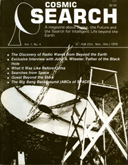![[NAAPO Logo]](../../Images/NAAPOsm.jpg) North American AstroPhysical Observatory (NAAPO)
|
|
In Review:
By: John Kraus
Some Kings and Presidents were Interested in Astronomy
In The View from a Distant Star, Harlow Shapley* (*Dell Publishing Co., Inc., New York, 1963. Harlow Shapley (1885-1972) was Director of Harvard Observatory from 1921 to 1952 and Paine Professor of Astronomy at Harvard until his retirement in 1956. He was widely regarded as the dean of American astronomers.) writes informally and perceptively about many facets of human existence and of mankind's relation to the cosmos.
In Chapter 8, "The One World of Stars", he notes that the sixth President of the United States, John Quincy Adams, said that the culture of a nation can be judged by the condition of its astronomical observatories. Unfortunately, Shapley continues, Adams was succeeded in the White House by men "whose devotion to culture did not include active promotion of national efforts to take care of the stars," although Franklin D. Roosevelt did participate in ceremonies on the 400th anniversary of the death of Copernicus. Shapley goes on to quote F.D.R.'s whimsical disagreement with Copernicus: "He (Copernicus) looked through the right end of the telescope, thus magnifying his problems. I use the wrong end because it makes things much easier."
"Governments and stars have long been associated," continues Shapley. "In ancient times rulers made use of astrologers to guide their acts and justify their sins." Babylonian, Egyptian, Chaldean, Greek and Roman rulers supported observatories. The famous astronomers Tycho Brahe and Johannes Kepler were supported by the German Emperor Rudolph II, and Sir William Herschel was private astronomer to King George II of England.
King Charles II of England established the Royal Greenwich Observatory, King Christian IV of Denmark the Copenhagen Observatory, Czar Nicholas I of Russia the Pulkovo Observatory, Prince Friedrich of Germany the Potsdam Observatory, and President Avila Camacho established the modern Tonanzintla Observatory with his own personal funds.
However, since John Quincy Adams took part in founding the Harvard Observatory, no U.S. President has been so involved.
Why were some heads of state so keen on astronomical exploration? They may have had practical reasons — for navigation and time keeping — or, perhaps, Shapley concludes, they realized they had inherited from their ancestors a great unfilled curiosity about the stars which they wanted to satisfy.
|
